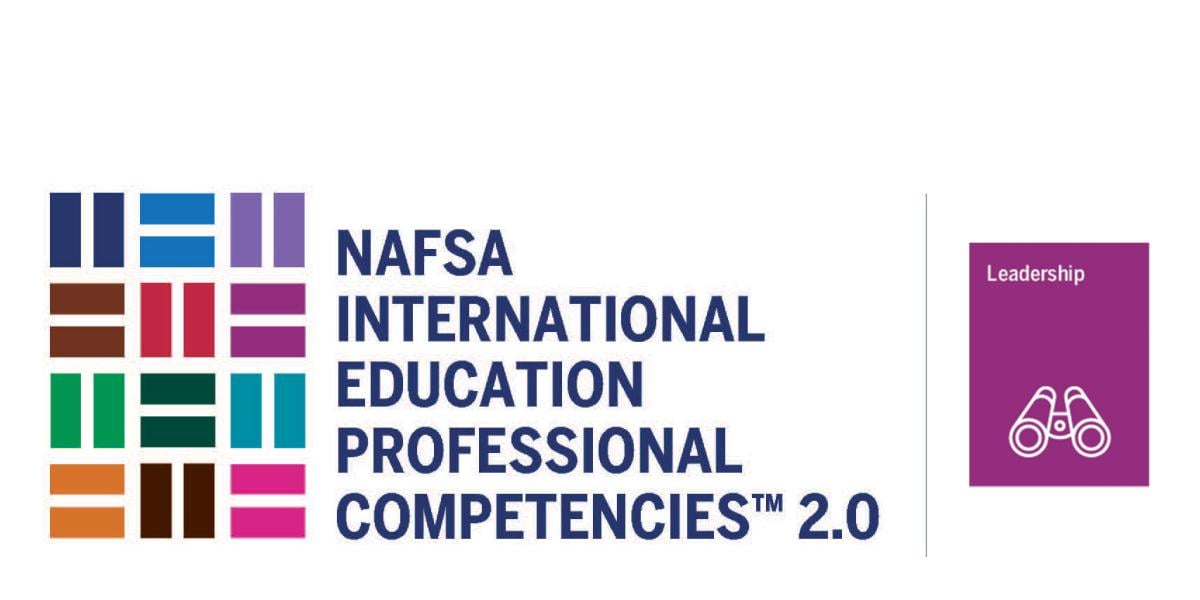Reflections on the NAFSA IE Competencies: Leadership

Editor’s note: This is the first article in a new series for 2023 that explores one of the 12 International Education Professional Competencies 2.0 in each issue of International Educator. Written by NAFSA members, each article covers how that competency is critical to the future of the field and what it looks like in practice.
As NAFSA celebrates its 75th anniversary this year, we reflect on the core competencies and skills that have led us into 2023, starting with leadership. International educators are innovative and resilient navigators, who will strengthen the field for years to come.
If there is one truth we have learned in recent years, it is that change is constant in our field. The pace of transformation is undeniably fast-moving, unpredictable, and likely to pervade our activities in the years ahead. Strong leadership skills are necessary tools to manage ambiguity and conflict in higher education settings.
Leaders as Navigators
Leadership in today’s environment undoubtedly assumes a new character in our evolving world. It is no longer the leadership of hierarchical structures and one-dimensional organizations. Today, an effective leader needs to possess the knowledge, skills, and abilities of a navigator who can transcend boundaries. One who can see the big picture with an eye for inclusive excellence opportunities.
A navigator scans their surroundings, listens to the markers on the path, utilizes key resources and tools of the trade, and provides a way forward—not only for the navigator, but for the followers and those leaders who will come next on the path. A navigator recognizes there are multiple routes leading to multiple outcomes.
As international educators, navigation is a well-honed and perhaps natural skill, given our focus on travel, mobility, and new experiences. This aspect of leadership should suit us well not only in our role as international educators but also in our role as leaders within our institutions and our professional organizations.
Progress Is About People
This new style of leadership requires us to step back and constantly analyze where we are and where we need to go. A wise person once advised me that my job as a leader is to think. Step back and step outside your frame of reference to reflect, think, and consider alternatives to your current line of thought.
Ask questions: Why higher education? What alternative perspectives exist about international education or intercultural interactions? Who is higher education designed for? Why is it important to educate about intercultural interactions within higher education at all? Who decided it was important and why?
International education leaders keenly appreciate that without relationships and people, there is no progress. International education thrives on relationship building. This work typically attracts those to the field who have themselves encountered intercultural difference or lived and worked in diverse cultural settings. We are curious about those who are different and face relationships with empathy, welcoming varied cultural perspectives. These interculturally competent skills are the attributes of a good leader and will indeed be critical for the next 75 years as new and yet-to-be discovered concerns arise.
The time for change is upon us. As interculturally competent leaders, we are poised to lead the way to the future. Let us think and let us navigate together. •
Dawn Wood is dean of global learning at Kirkwood Community College.
NAFSA Resources
About International Educator
International Educator is NAFSA’s flagship publication and has been published continually since 1990. As a record of the association and the field of international education, IE includes articles on a variety of topics, trends, and issues facing NAFSA members and their work.
From in-depth features to interviews with thought leaders and columns tailored to NAFSA’s knowledge communities, IE provides must-read context and analysis to those working around the globe to advance international education and exchange.
About NAFSA
NAFSA: Association of International Educators is the world's largest nonprofit association dedicated to international education and exchange. NAFSA serves the needs of more than 10,000 members and international educators worldwide at more than 3,500 institutions, in over 150 countries.
NAFSA membership provides you with unmatched access to best-in-class programs, critical updates, and resources to professionalize your practice. Members gain unrivaled opportunities to partner with experienced international education leaders.











